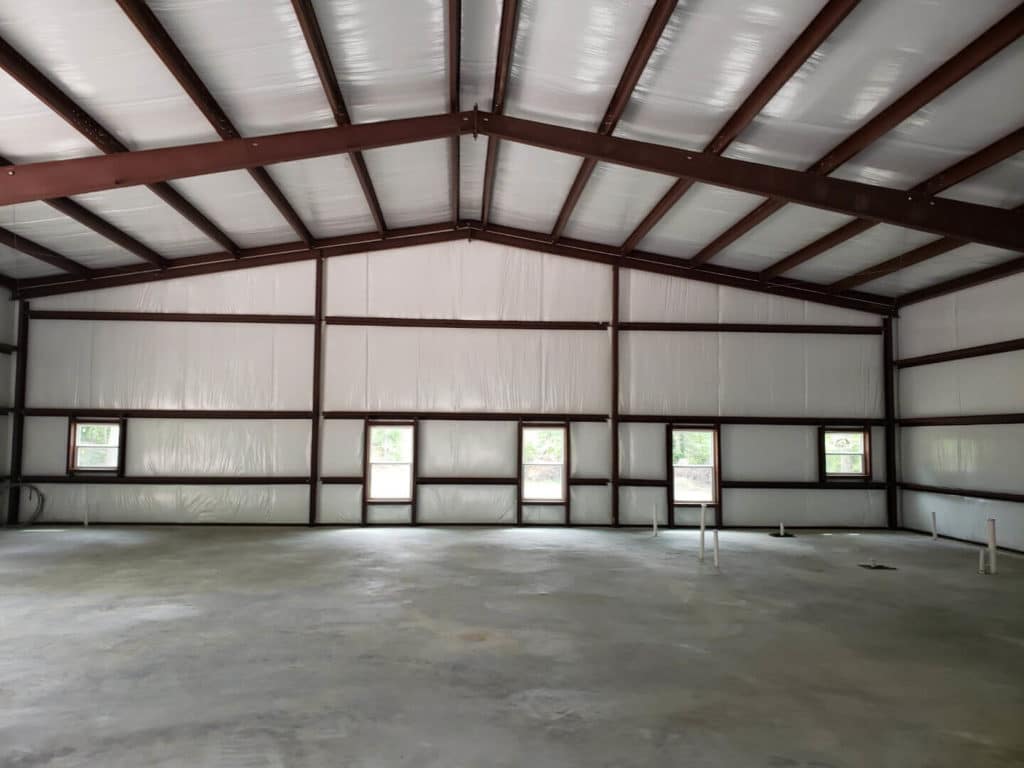RV storage gets pricey and you never know if your RV is truly safe unless it’s locked in a fully enclosed, private storage unit. Most storage places do not provide locked garages for RVs, but instead, an open spot. Some places might provide a metal cover for an RV, but you still risk someone damaging your RV when parking their own. If you have the room at your house, building a metal RV cover keeps the weather off your RV and you have less chance of having it damaged or broken into.

RV Storage at Home
When you consider building an RV storage solution at your home, you should consider several factors.
Type of Building
The type of building you choose depends on the type of weather you frequently see and the foliage surrounding your RV cover.
Iron Framed vs Tube Framed
In Louisiana and Mississippi, hurricanes and tropical storms are just part of life. When choosing the type of structure you’ll be protecting your RV with, you need to consider whether you want to simply protect your RV from the sun and normal rain, or if you want true protection from all but the worst of hurricanes. An iron-framed structure is your best option during a tropical event.
Roof Only, Roof With Sides, or Fully Enclosed
Depending on the level of protection you need for your RV, there are a multitude of options for how much coverage you should get. A roof-only will provide protection from the rain and direct sunlight that causes damage to the roof of your RV. This may be enough for many people. If your property has a lack of trees and shade, you may consider adding sides, or even partial sides to prevent fading from sunlight. If you are looking to protect your RV from theft or vandalism, a fully enclosed building is the way to go.
The Foundation
You have several choices for a foundation for your RV-port. You can build it on hard-packed ground, put down gravel, or put the building on a slab. If the ground is not firm, you should consider putting a slab down, so the RV does not sink.
If you choose gravel, choose road gravel and don’t go bigger as you’ll get some pretty good-sized chunks of rock that could damage the tires. In fact, the next best thing to a concrete slab is to put down a 4-inch layer of road gravel, then a 2-inch layer of crusher run (also known as crush and run). Crusher run is composed of pulverized stone of several sizes, though usually not larger than about an inch, plus a lot of dust and chips from the fragments that fall through as larger rock are run through the crusher to get it to the size needed.
If you put down a layer of crusher run over gravel, then drive on it to pack it in, you end up with a pad that is almost as hard as concrete.
Additional Factors
Other factors you should consider:
- Installing electric, water and sewer/septic hookups
- The size – you might want a larger building so you can open the slides or awnings inside
- Your upgrade plans. If you plan on upgrading your RV in a few years, you should consider a metal building that is large enough for the new RV.
The professionals at ADCO Metals are more than happy to help you plan out the perfect building to protect your RV. Give us a call today or fill out the form on our Contact page and we’ll be in touch.